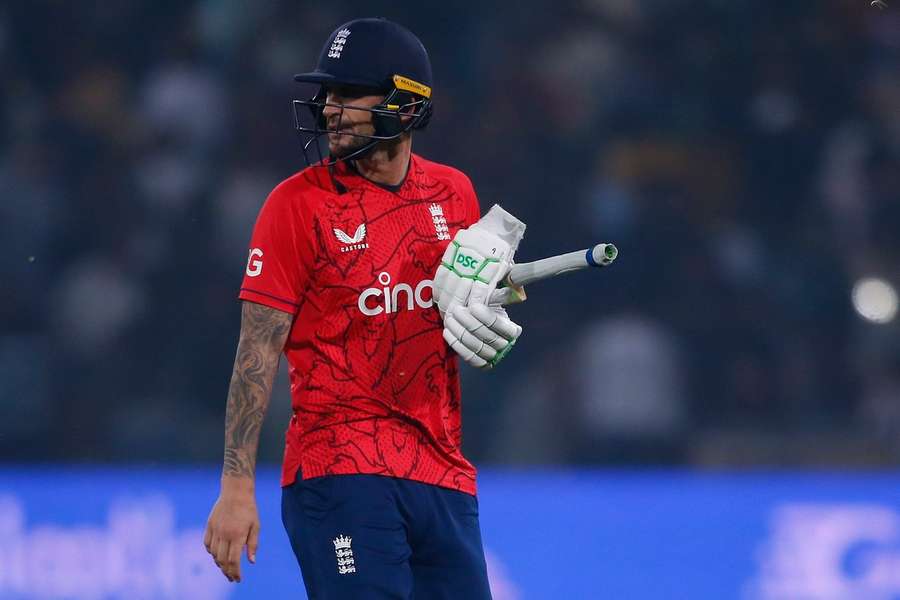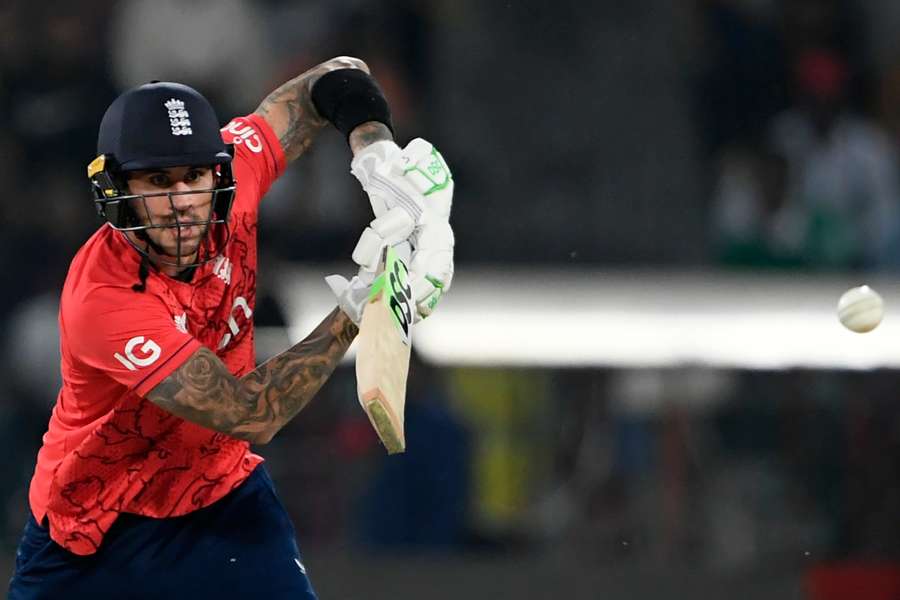Hales deserved his England call-up - but he still has a lot to prove at the highest level

Prior to the 2019 World Cup, Hales was banished from the England squad after failing a drugs test. Eoin Morgan, the captain at the time, completely lost all his trust in the batsman, meaning he didn't play for England again during his reign.
Arguments could be made that Hales served his sentence by missing his side's historic World Cup victory, and should have returned to the squad at least. But Morgan didn't see it that way. With Bairstow finding his own at the top of the order in One Day International cricket in an unabating partnership with Roy, as well as Buttler being elevated to an opening role in T20s, Hales was no longer in the set-up at all.
During his spell out of the side, his main focus was on franchise cricket, where he became one of the most coveted and destructive players around.
Since 2019, he has played 45 matches for the Australian Big Bash side Sydney Thunder, scoring 11 half centuries and one hundred. In the 2021/22 campaign, Hales pummeled 383 runs for the Thunder, the second highest in the side.
In the most recent Pakistan Super League campaign, he averaged 44.37 for Islamabad United, an improvement on his all-time average (37.29) in that competition.
In the last T20 Blast, he scored 374 runs for Nottinghamshire at a strike rate of 193.78. In The Hundred for the Trent Rockets, he battered 259 runs at 152.35.
In fact, only Pakistan captain Babar Azam can claim to have better numbers than Hales. Since his last international match, Azam has scored 4639 runs in T20 cricket, with Hales in second at 4587.
So it's fair to say that he's been in pretty good form.
His name is amongst the all-time greats when it comes to this format. He is the eighth highest run scorer (10,104) in T20 history, behind the legendary names of Chris Gayle (14,562), Kieron Pollard (11,801), Shoaib Malik (11,771), Virat Kohli (10,902), David Warner (10,870), Aaron Finch (10,699), and Rohit Sharma (10,470)
It is without a doubt, with new skipper Buttler taking a more lenient stance on Hales, he fully merited his call up.
England record
On the surface of it all, his numbers for England look pretty good.
Since his debut in 2011, he has blasted 1774 runs across 66 matches (including the recent series against Pakistan). He averages a very healthy 30.06 with a good strike rate of 136.98.
His average is far superior to previous opener Roy (24.15), and even the injured Bairstow (27.85) - who, to be fair, has been shuffled around the order a lot.
He is only just below Buttler (32.75), a player set to go down as England's greatest ever limited overs player.
The issue with Hales is that he has hoarded a lot of his runs in England. There is a large disparity in his average when playing at home (45.29), and in the nations of Australia (13.80), India (21.87), South Africa (21.50), the West Indies (20) and Sri Lanka (21.33).
In his return to the England fold, he made his first visit to Pakistan, and registered scores of 53(40), 26(21), 5(3), 1(3), 27(12) and 18(13). Not great at all.

The reason for this is simply due to the fact that pitches in England have been so flat in the last half a decade. They have been set up in a way to suit the relentless offence of the English team, and it means the ball comes on beautifully for batsmen.
For the stand-and-deliver type player that Hales is, it suited him down to an absolute T. Anything that was remotely in his arc, was sent into the stands with ease.
When playing abroad, conditions tend to be a lot different and more difficult, especially in the sub-continent. With this in mind, it explains why there is such a contrast in his stats.
Tournament record
His Twenty20 tournament record continues the trend of his overall England record. Some stunning moments and knocks, but still littered with some inconsistencies that come with the package of being an England opener.
In the 2012 World Cup, he hit scores of 31(27), 0(2), 68(51), 22(15) and 3(5). The 2014 World Cup: 0(2), 116(64), 38(22), and 12(17). The 2016 World Cup: 28(26), 17(7), 0(4), 20(19) and 1(3).
Frankly, these numbers are far from impressive. The 116 against Sri Lanka in 2014 was the first time that an England player had scored an international T20 century, but besides that and a few flashy, quick cameos, there is nothing to write home about.
And that has been Alex Hales in a nutshell. Capable of brutal excellence, but incapable of putting together a run of good scores anywhere outside of England.
So why was he heralded and praised to the extent he was when he previously played for England?
Simply put, he and Roy were the spearheads of a new way of playing cricket. Their ultra-attacking style was thrilling and fun, and even if they didn't make huge scores, keeping their strike rate high and making a brisk 25 was seen as vital to the way England wanted to play. They imposed themselves on opposition bowlers.
It's not an excuse for his low numbers away from home and in major tournaments, but it is potentially the reason why he continued to play so many games for England. Hales was like a shiny new toy.
But the issue is now, England are producing several players who can play like that. Phil Salt is the exact prototype of an England opener and has played a few sensational knocks. Will Jacks has the potential to do that too, Buttler is, well, Buttler, and Bairstow has been awe-inspiring when opening in ODI cricket.
He is just one of many, and no longer stands out from the rest of the pack. If he wants to solidify his place at the top of England's T20 side, he will need to be more consistent, especially in this upcoming major tournament where he can really prove he is better than ever.
Director of Cricket, Rob Key, revealed that Bairstow - who had been batting in the middle order in IT20s - was initially set to open next to Buttler in place of Roy before he picked up his injury.
But with Harry Brook being the player of the series in Pakistan and solidifying a spot for himself in the engine room, when Bairstow returns, his usual middle order slot will also no longer be available. This piles on the pressure even more on Hales. A poor World Cup means the Yorkshire batsman can go into the opening role in place of him.
The extremely low average in Australia will be a concern, especially with the Twenty20 World Cup set to be held there. Numbers like that suggest that he is far from being the guaranteed success that people expect him to be.
However, he is a far better player than he was five years ago, and has plenty more experience, especially in Australia thanks to his Big Bash exploits.
With a bit of luck, Hales has finally returned to the England side. He has deserved his call up though, but that doesn't mean that he is going to score runs for fun. Franchise cricket is a couple of notches below international cricket, and he, yet again, must make the step up. It is set to be a pivotal few months in the career of Hales, and he will have to do all his talking with the bat.



